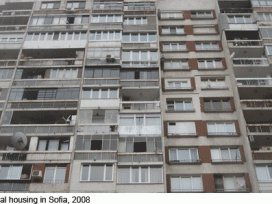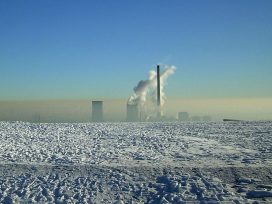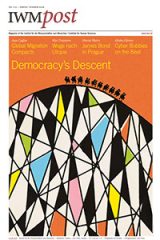

In collaboration with
Institute for Human Sciences
The Institute for Human Sciences / Institut für die Wissenschaften vom Menschen (IWM) is an independent institute for advanced study in the humanities and social sciences. Since its foundation in 1982, it has hosted more than 1500 scholars, journalists and translators from all over the world. Many of the Institute’s Permanent and Visiting Fellows are regular contributors to Eurozine or its focal points The World in Pieces and Ukraine in European Dialogue (see below).
Website: www.iwm.at
Twitter: @IWM_Vienna
Youtube: IWMVienna

Articles
9/11 organizer Khalid Sheikh Mohammed exploited his trial to remind the court of its own human rights obligations, while Osama bin Laden’s video statements include appeals to religious pluralism. Al-Qaeda’s use of liberal categories is central to its rhetoric on war and justice, writes Faisal Devji.

“Democracy” in post-communist Europe is strongly associated with high levels of state-sponsored social protection, indicating a culture far removed from the prevalent system of market-mediated private provision. The dissatisfaction with democracy expressed by the many not to have benefited from transition suggests CEE welfare states have a long way to go before they attain western levels of credibility. Their democracies depend on that gap being bridged.
An historian can define European identity descriptively, as Krzysztof Pomian demonstrates in a tour of European culture since the first millennium before Christ. But the real controversy lies elsewhere, in the political question: what of the European past is worth preserving?

Rising energy costs and the eco-social consequences of climate change are causing anxieties about the future to increase, while trust in the ability of political elites to solve these problems is evaporating. Reaching eco-political targets calls for more participation of citizens as active architects of their society, write Claus Leggewie and Harald Welzer.
Focal points

Inspired by a lecture that Clifford Geertz delivered in 1995 at the Institute for Human Sciences in Vienna, this focal point engages with ‘deep diversity’, ‘a sense of dispersion, of particularity, of complexity and of uncenteredness’ rather than unified world order. It follows the launch of a research programme of the same name at the institute in January 2023.

Post-revolutionary Ukrainian society displays a unique mix of hope, enthusiasm, social creativity, collective trauma of war, radicalism and disillusionment. With the Maidan becoming history, the focal point ‘Ukraine in European Dialogue’ explores the new challenges facing the young democracy, its place in Europe, and the lessons it might offer for the future of the European project.
Projects and publications

